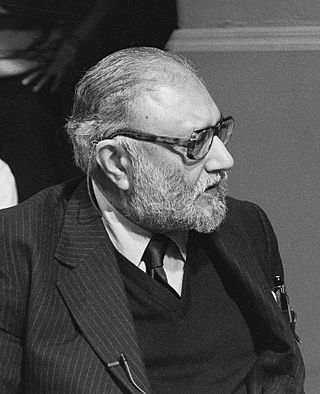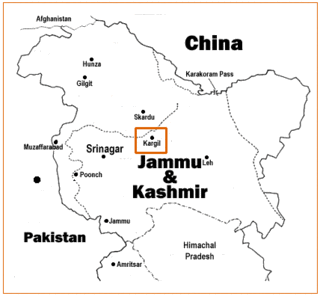Related Research Articles

The Government of India, also known as the Central Government, is the national authority of the Republic of India, a federal democracy located in South Asia, consisting of 28 union states and eight union territories.

Chief Justice Hamoodur Rahman, NI. HI, was a Pakistani Bengali jurist and an academic who served as the Chief Justice of Pakistan from 18 November 1968 until 31 October 1975.

The Higher Education Commission is a statutory body formed by the Government of Pakistan which was established in 2002 under the Chairmanship of Atta-ur-Rahman. Its main functions are funding, overseeing, regulating and accrediting the higher education institutions in the country.

Satyanarayan Gangaram Pitroda, also known as Sam Pitroda is an Indian telecommunication engineer and entrepreneur. He was born in Titlagarh in the eastern Indian state of Odisha to a Gujarati family. He was also an advisor to the PM during Dr. Manmohan Singh's tenure and for United Nations.

Marpadi Veerappa Moily is an Indian politician belonging to the Indian National Congress from the state of Karnataka.
Research Quality Framework (RQF) was a component of Backing Australia's Ability, an initiative of the Australian Government to formulate a best practice framework for assessing research quality and the impact of research, and ensure that public funding was being invested in research which would deliver real benefits to the wider community. RQF was to bring public funding of research in line with government policy for funding to be determined by outcomes achieved.
The Ministry of Personnel, Public Grievances and Pensions is a ministry of the Government of India in personnel matters specially issues concerning recruitment, training, career development, staff welfare as well as the post-retirement dispensation.

The IBSA Dialogue Forum is an international tripartite grouping for promoting international cooperation among these countries. It represents three important poles for galvanizing South–South cooperation and greater understanding between three important continents of the developing world namely, Africa, Asia, and South America. The forum provides the three countries with a platform to engage in discussions for cooperation in the field of agriculture, trade, culture, and defence among others.

The Economic Research Institute for ASEAN and East Asia or ERIA is an international organization established in Jakarta, Indonesia in 2008 by a formal agreement among Leaders of 16 countries in the East Asian region to conduct research activities and make policy recommendations for further economic integration in the East Asia. ERIA works very closely with both the ASEAN Secretariat and 16 Research Institutes to undertake and disseminate policy research under the three pillars, namely “Deepening Economic Integration”, ”Narrowing Development Gaps”, and “Sustainable Development” and provide analytical policy recommendations to Leaders and Ministers at their regional meetings. ERIA provides intellectual contributions to East Asian Community building and serves as a Sherpa international organization. ERIA Ranks 9th among the world's "Top International Economics Think Tanks" according to the 2020 Global Go To Think Tanks Index Report conducted by the University of Pennsylvania.

The Ministry of Mines is the ministry in the Government of India. The ministry functions as the primary body for the formulation and administration of laws relating to mines in India. The head of the ministry is Pralhad Joshi, who has been serving since June 2019.
The Administrative Reforms Commission (ARC) is the commission appointed by the Government of India for giving recommendations for reviewing the public administration system of India. The first ARC was established on 5 January 1966. The Administrative Reforms Commission was initially chaired by Morarji Desai, and later on K. Hanumanthaiah became its chairman when Desai became the Deputy Prime Minister of India.
The Law Commission of India is an executive body established by an order of the Government of India. The commission's function is to research and advise the government on legal reform, and is composed of legal experts, and headed by a retired judge. The commission is established for a fixed tenure and works as an advisory body to the Ministry of Law and Justice.

Science and technology is a growing field in Pakistan and has played an important role in the country's development since its founding. Pakistan has a large pool of scientists, engineers, doctors, and technicians assuming an active role in science and technology. The real growth in science in Pakistan occurred after the establishment of the Higher education Commission in 2002 which supported science in a big way and also became the major sponsor of the Pakistan Academy of Sciences under the leadership of Prof. Atta-ur-Rahman. The emphasis was placed on quality rather than numbers during this period. The quality measures introduced by Prof. Atta-ur-Rahman as Founding Chairman HEC included:1) All Ph.D. thesis were evaluated by eminent foreign scientists,2) All PhD theses and research papers were checked for plagiarism 3) Some 11,000 students were sent abroad to leading universities for PhD level training and absorbed on their return, 4) Appointments at faculty positions were linked to international stature of the applicants as judged from their international publications, patents and citations, and (5) Quality Enhancement Cells were established in all universities for the first time in the history of the country. (6) The minimum criteria for establishment of a new university were approved by the Cabinet and universities that did not meet these criteria were closed down. (7) The Model University Ordinance was approved setting the governance parameters for new universities. (8) A list of fake higher education institutions was prepared and made public. (9) Quality Assurance Agency (QAA) was set up within the Higher Education Commission that established Quality Enhancement Cells (QECs) as its operational units in public and private-sector universities across the country. (10) The funding of universities was linked to excellence in teaching and research under a formula based funding mechanism that considered enrolment, subjects and quality of teaching and research. The first IT policy and implementation strategy was approved under the leadership of Prof. Atta-ur-Rahman, then Federal Minister of Science & technology, in August 2000 which laid the foundations of the development of this sector On the request of Prof. Atta-ur-Rahman, Intel initiated a nationwide programme to train school teachers in Information and Communication technologies in March 2002 which has led to the training of 220,000 school teachers in 70 districts and cities across Pakistan. A 15-year tax holiday was approved on the recommendation of Prof. Atta-ur-Rahman which has resulted in growth of IT business from $30 million in 2001 to over $3 billion. The Pakistan Austria University of Applied Engineering (Fachhochschule) has been established in Haripur Hazara under a Steering Committee Chaired by Prof. Atta-ur-Rahman in which students will get degrees from several Austrian universities. Pakistan's growth in scientific output can be seen from the fact that in 1990 Pakistan published 926 scholarly documents while in 2018 the number rose to 20548, a twenty times increase.In contrast India published 21443 scholarly documents in 1990 and the number rose to 171356 in 2018, an eight times increase. In 2018, 336 people per million were researchers in the R&D in Pakistan compared to 256 people per million being researchers in India. The reforms begun by Prof. Atta-ur-Rahman FRS in 2003-2008 have continued over the subsequent decade and according to the Web of Science report, there was a 300% growth in research publications in 2019 over the decade, with 2019 marking the first year in which Pakistan was ranked above the world average in research. In 2019, Pakistan produced 300% more publications indexed in the Web of Science Core Collection than in 2010. In the decade of 2010-2019, more than half of Pakistan’s research was published in journals with Impact Factor. The global influence of Pakistan’s research is increasing as scientists in the country are publishing more in top quartile journals. The Category Normalized Citation Impact of Pakistan’s publications has risen from 0.67 to 1.03. output. As of 2020, Pakistan has 85% teledensity with 183 million cellular, 98 million 3G/4G and 101 million broadband subscribers, due to the foundations laid by Prof. Atta-ur-Rahman of the IT and telecom industry during 2000-2008. In an analysis of scientific research productivity of Pakistan, in comparison to Brazil, Russia, India and China, Thomson Reuters has applauded the developments that have taken place as a result of the reforms introduced by Prof. Atta-ur-Rahman FRS, since Pakistan has emerged as the country with the highest increase in the percentage of highly cited papers in comparison to the "BRIC" countries

The Canada India Foundation is a Canadian non-profit organisation established in 2007. The main stated objective of CIF comprises promoting Canada–India relations through their active intervention in public policy, which would cover domestic policies and bilateral issues affecting the Indo-Canadian community, including issues such as culture, education, trade and investment, immigration, diplomatic, political, and strategic relations.
Central Secretariat Service is the administrative civil service under Group A and Group B of the Central Civil Services of the executive branch of the Government of India. They are governed by Central Secretariat Service Rules of 1962, which has been issued under the powers of Article 309 of the Constitution of India. The service members work under restrictions and rules of Central Civil Services (Conduct) Rules.

The Prime Minister's Office (PMO) consists of the immediate staff of the Prime Minister of India, as well as multiple levels of support staff reporting to the Prime Minister. The PMO is headed by the Principal Secretary, currently Pramod Kumar Mishra. The PMO was originally called the Prime Minister's Secretariat until 1977, when it was renamed during the Morarji Desai ministry.
The National Commission on Farmers (NCF) is an Indian commission constituted on 18 November 2004 under the chairmanship of Professor M.S. Swaminathan to address the nationwide calamity of farmers suicides in India. The Terms of Reference reflected the priorities listed in the Common Minimum Programme. The NCF submitted four reports in December 2004, August 2005, December 2005 and April 2006 respectively. The fifth and final report was submitted on 4 October 2006. The reports contain suggestions to achieve the goal of "faster and more inclusive growth" as envisaged in the Approach to 11th Five Year Plan and are collectively termed the M.S. Swaminathan report for farmers
The U.S.-Japan Conference on Cultural and Educational Interchange(CULCON) is a bi-national advisory panel to the U.S. and Japanese governments that serves to elevate and strengthen the vital cultural and educational foundations of the U.S.-Japan relationship.

The NITI Aayog serves as the apex public policy think tank of the Government of India, and the nodal agency tasked with catalyzing economic development, and fostering cooperative federalism and moving away from bargaining federalism through the involvement of State Governments of India in the economic policy-making process using a bottom-up approach. Its initiatives include "15-year road map", "7-year vision, strategy, and action plan", AMRUT, Digital India, Atal Innovation Mission, Medical Education Reform, agriculture reforms, Indices Measuring States’ Performance in Health, Education and Water Management, Sub-Group of Chief Ministers on Rationalization of Centrally Sponsored Schemes, Sub-Group of Chief Ministers on Swachh Bharat Abhiyan, Sub-Group of Chief Ministers on Skill Development, Task Forces on Agriculture and up of Poverty, and Transforming India Lecture Series.

The Kargil Review Committee (KRC) was set up by the Government of India on 29 July 1999, three days after the end of the Kargil War. The committee was set up "to examine the sequence of events and make recommendations for the future".
References
- ↑ "Sam Pitroda resigns as information adviser to Prime Minister - Times of India". The Times of India. 4 June 2014. Retrieved 17 July 2016.
- ↑ Culture India - Knowledge Commission
- ↑ The Hindu : Tamil Nadu News : Vice-Chancellors constantly under political pressure, laments academic
- ↑ The Hindu : National : Knowledge panel clarifies suggestions